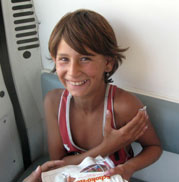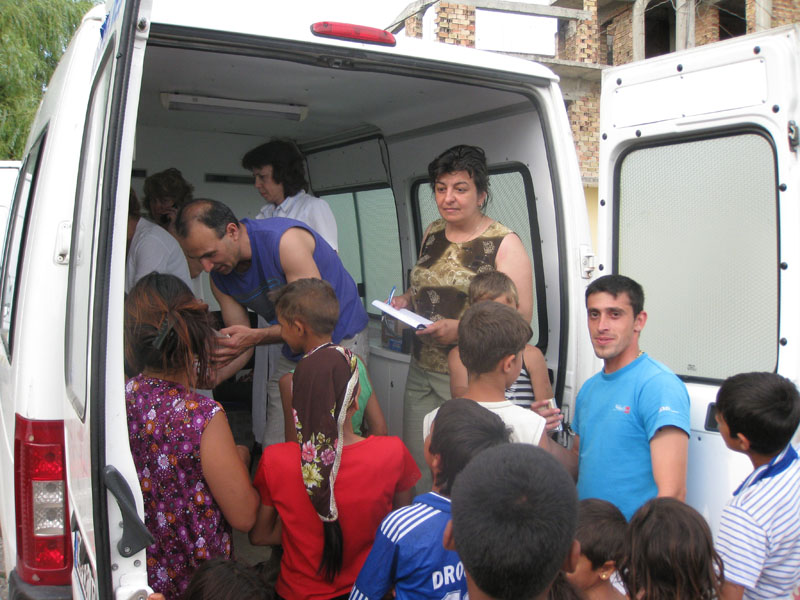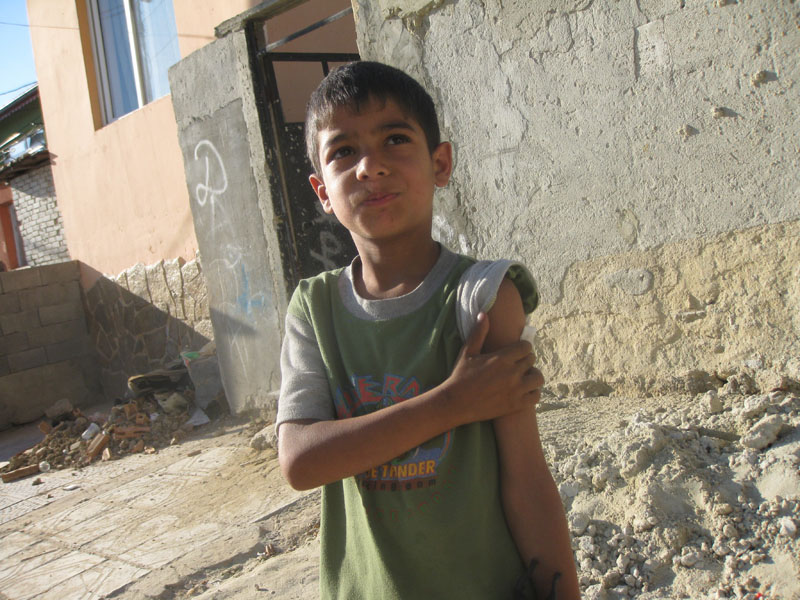 Health mediators in Bulgaria are working to improve vaccination rates among Roma groups by talking with parents and even bringing some children to the GP for immunisations. However, overcoming cultural and health system barriers is essential if immunisation goals are to be reached.
Health mediators in Bulgaria are working to improve vaccination rates among Roma groups by talking with parents and even bringing some children to the GP for immunisations. However, overcoming cultural and health system barriers is essential if immunisation goals are to be reached.
Diliana Dilkova of the National Network of the Health Mediators in Bulgaria told Vaccines Today that health mediators are a trusted source of health information and key players in a tailored immunisation campaigns designed for Roma populations.
The need could hardly be greater. Vaccination rates are typically lower among Roma groups, putting them on the frontline of the 2010 measles outbreak in Bulgaria and the ongoing rubella epidemic in Romania. Both diseases can lead to serious complications, especially where access to health services is weak.

At a European level, efforts to wipe out measles and rubella by 2015 are likely to run aground unless vaccine uptake in hard-to-reach communities is dramatically increased.
Cultural issues
Many of the common concerns about vaccines in Roma populations echo those outside the community: parents worry about side effects and under-estimate the risk posed by vaccine-preventable childhood diseases.
“In the Roma community these views are also present plus the suspicion that vaccination could cause sterility. In general, the Roma community needs more health information about vaccines and how they work,” says Dilkova.
Children may also miss out either because their parents do not have health insurance and have fewer contacts with health services as a result, or because the children are not registered with GPs.

Access to services
In some cases, says Dilkova, doctors are reluctant to register children from Roma communities because of the workload involved in tracking their immunisation status. Here again, health mediators can help.
“The health mediators work with GPs to find the parents of unvaccinated children and explain why vaccination is important. In cases where the parents promise to take their child to the doctor but doesn’t follow through, sometimes the health mediator takes the child to the GP,” Dilkova explains.
One of the simplest things health authorities can do is make immunisation services available locally. We have better results when the vaccination campaigns are organised in the field, within the community, at a place where Roma people could gather without leaving their locality,” she says.
Full text of Q&A with Diliana Dilkova of the National Network of the Health Mediators
Vaccines Today: What is the role of health mediators?
Diliana Dilkova: The health mediator (HM) is an intermediary who facilitates access to health and social services for vulnerable groups of the population, with focus on ethnic minorities including Roma. HMs in Bulgaria have been included in the national classificatory of professions since 2007 and one of their most important duties, according to their job description, is to work for better vaccination coverage of Roma population.
Vaccines Today: How does this work?
Diliana Dilkova: In the first months of their work, newly-trained health mediators have several important tasks one of which is to establish contacts with all health and social institutions representatives working on the territory of the municipality. One of these important contacts is with the general practitioners that work with Roma patients. The GPs prepare lists with non-vaccinated children and give them to the HM. The HM finds the parents of these children and explains to them why it is important to vaccinate their children: sometimes the HM takes the child to the GP – in cases when the parents promise to do this several times but don’t do it.
In recent years HMs have participated in several complementary vaccination campaigns organised by the Ministry of Health. HMs did this in partnership with the regional divisions of the Ministry (the Regional Health Inspectorates who are in charge of dealing with missed vaccinations). HMs organised health information campaigns in Roma communities about 1 week before the date for vaccination in order to explain parents why they should vaccinate their children.
Vaccines Today: Can you give examples of campaigns HMs have worked on?
Diliana Dilkova: In 2010 during the EU measles epidemic outbreak, more than 24,000 people in Bulgaria were infected with measles and 24 children died. In 2010, HMs participated in complementary vaccinations against measles to help control the outbreak. In 2011 HMs were involved in complementary vaccinations against polio. 2012 and continuing saw HM participation in information campaigns for cervical cancer vaccination – since November 2012 the cervical cancer vaccination is free-of-charge for all 12-year old girls in Bulgaria.
Vaccines Today: Are there many HMs working in Bulgaria at present?
Diliana Dilkova: In 2013 in Bulgaria 130 HMs are working in more than 70 municipalities, paid by the state budget. Another 17 are trained and work in 3-year GSK financed project “Together for health” implemented in Bulgaria, Hungary, Romania and Slovakia.
Vaccines Today: In your experience, what is the attitude of the Roma community to vaccine-preventable diseases?
Diliana Dilkova: In Bulgarian society the old-fashioned persists that measles and rubella are diseases the child should just “pull through”. In some cases healthy children are taken to meet infected ones because some still believe that the earlier the child “passes” through this, the better. In the Roma community these views are also present plus the suspicion that vaccination could cause sterility. In general, the Roma community needs more health information about vaccines and how they work.
Vaccines Today: Do parents have other concerns?
Diliana Dilkova: Roma parents are concerned that vaccination could make their child ill. They are not acquainted with the normal side-effects of vaccination such as redness etc; the GPs usually don’t have the time to explain to every parent what is normal and what is not and sometimes parents get concerned if the child feels discomfort. This is also a task of the HM – to explain all this – why this vaccine is important, why it should be administered within a given period, what are the possible complications if the child gets ill from a vaccine-preventable disease.
After explanation from GP or HM, Roma parents usually agree that vaccination is needed and important but still some of them don’t take their children to the GP’s consulting room. In this respect we have better results when the vaccination campaigns are organised in the field, within the community, at a place where Roma people could gather without leaving their locality. The other successful method is the health-informational work of a HM in the community and in certain cases – the accompaniment of some children to the GP.
Vaccines Today: Where do parents get information and who do they trust?
Diliana Dilkova: They get a lot of information from their GP – when the GP is willing and has the time to give it. Unlike the trends in mainstream population not to trust in doctors, Roma still have high rates of trust in health professionals. This should be used and doctors should be advised to pay more attention to providing Roma parents with health information and advice. HMs are also a trusted source of information in communities where they work.
Roma parents get health information via cable TV channels and trust it but usually this is the easiest way to get wrong information. For example, a few months ago a Turkish TV channel had a broadcast about the danger of vaccinating girls with cervical cancer vaccine and in many Roma communities where the Turkish language is spoken HMs reported refusals of Roma parents to vaccinate their 12-year old girls with the free-of-charge vaccine.
Vaccines Today: Why are vaccination rates typically lower in the Roma community than the national average?
Diliana Dilkova: There are a number of reasons some of which are cultural others are health system issues.
Health culture in the Roma community is usually lower compared to the health culture of the mainstream population for many reasons including lower literacy levels, poorer access to health information, lower social status – parents think first about survival: food, clothes, housing – the cultural specifics according to which health is not top priority. As a rule, adult Roma visit health services mainly in cases of emergency, when their health condition has worsened considerably. Due to unemployment and poverty, a big share of Roma people does not have health insurance, although all children in Bulgaria are insured until 18 years of age. They general visit the GP on very rare occasions, sometimes only when their children are ill – but still the rare contacts with health professionals reflect in lower level of health culture and awareness.
Vaccines Today: What about systems or organisational issues?
Diliana Dilkova: In Bulgaria vaccinations are the obligation of GPs. Each child should be subscribed to a GP immediately after his or her birth. However, because of the problems in the health system and in the distribution of GPs throughout the country, there are many GP practices that are vacant. This is usually the case in rural municipalities where one GP takes care of patients in between three and five villages and travels to each of them for 1 day per week; sometimes the GP doesn’t even visit all the villages that they are responsible for and the patients have to arrange their own transportation to go for a check-up or vaccination.
In addition, there are a number of cases reported by HMs when GPs refuse to register Roma babies on their lists – they say the list is full but the real reason is that GPs often don’t want to have Roma patients because they cannot communicate well with them.
During the measles epidemic outbreak in 2010 there were serious grounds for concluding that many GPs have reported as vaccinated more children than they vaccinated in reality. We cannot provide data to prove it but this was a kind of “open secret” between professionals in the health field in 2010.
The reason for this is that GPs have to search for these children – going from house to house – and they don’t have the time for this. On the other hand, GPs are responsible for administering vaccinations – if they report children that are not vaccinated, they have to explain why to the Health Insurance Fund. In this case one option is to cooperate with HMs who could search for these children and talk with the parents. The other option is to report that come children are not vaccinated and the third option is to write down that everyone is vaccinated.
Vaccines Today: What can be done to address these problems?
Diliana Dilkova: It is important to recognise that Roma sometimes have their own concepts and fears concerning vaccination and addressing them. Intermediaries – like HMs – connected to the community should be used as they know the language, have the trust of the community, are suitably trained, and have knowledge in the sphere of health and social problems.
Health professionals should also be trained to work in a multi-ethnic environment with a focus on Roma health beliefs, Roma values and Roma groups. RRoma are not a homogenous group, each group has its specifics and it is important for each health professional to know with which group or groups he is working.
Access to vaccines should be made easier by organising vaccinations in the community. For this, preliminary health-information work with parents is crucial.
Roma families must be provided with information concerning vaccines and vaccine-preventable diseases. As many Roma are not able to read, this is best done via short videos, brochures with more pictures, less text and clear messages.
In Bulgaria, evangelical churches are very popular in Roma quarters – in some cases the pastors of these churches are open for discussing health issues with the community and are willing to help in sharing health information so the importance of vaccination could be one of the health issues addressed in this setting. Some of the best HMs in the country are pastors in evangelical churches.




